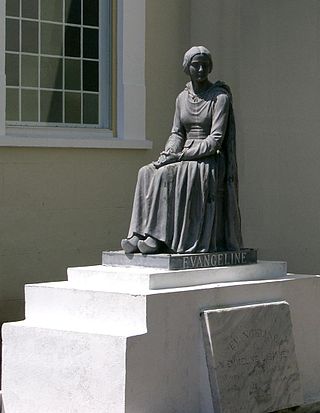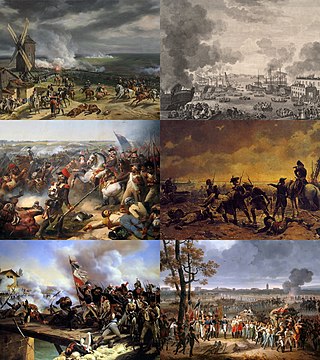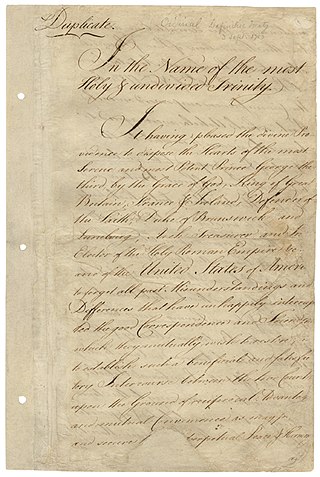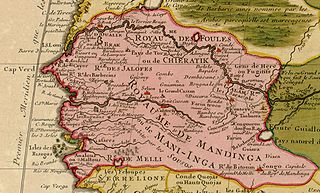
1760 (MDCCLX) was a leap year starting on Tuesday of the Gregorian calendar and a leap year starting on Saturday of the Julian calendar, the 1760th year of the Common Era (CE) and Anno Domini (AD) designations, the 760th year of the 2nd millennium, the 60th year of the 18th century, and the 1st year of the 1760s decade. As of the start of 1760, the Gregorian calendar was 11 days ahead of the Julian calendar, which remained in localized use until 1923.

The War of the First Coalition was a set of wars that several European powers fought between 1792 and 1797, initially against the constitutional Kingdom of France and then the French Republic that succeeded it. They were only loosely allied and fought without much apparent coordination or agreement; each power had its eye on a different part of France it wanted to appropriate after a French defeat, which never occurred.

The Treaty of Paris, also known as the Treaty of 1763, was signed on 10 February 1763 by the kingdoms of Great Britain, France and Spain, with Portugal in agreement, following Great Britain and Prussia's victory over France and Spain during the Seven Years' War.

The Treaty of Paris, signed in Paris by representatives of King George III of Great Britain and representatives of the United States on September 3, 1783, officially ended the American Revolutionary War and recognized the Thirteen Colonies, which had been part of colonial British America, as an independent, sovereign nation.

François Claude Amour, marquis de Bouillé was a French general. After distinguishing himself in the Seven Years' War, he was appointed governor of Guadeloupe in 1768. His most well-known military exploits took place in the West Indies during the American War of Independence, where he was involved in the French capture of a number of British possessions. Following that war he returned to France, where he held military commands in the country's northeast at the time of the French Revolution. A committed Royalist, he was a leading conspirator involved in the royal family's failed flight in 1791, whose failure forced Bouillé into exile. He continued to be active in consultative roles to members of the First Coalition, which opposed the forces of Revolutionary France in the early years of the French Revolutionary War. He died in exile in London, and is mentioned as a hated Royalist in the French national anthem, La Marseillaise.
The Treaty of Hubertusburg was signed on 15 February 1763 at Hubertusburg Castle by Prussia, Austria and Saxony to end the Third Silesian War. Together with the Treaty of Paris, signed five days earlier, it marked the end of the Seven Years' War. The treaty ended the continental conflict with no significant changes in prewar borders. Austria and Saxony renounced all claims to the Silesian territories ceded to Prussia in the 1742 Treaty of Berlin and the 1745 Treaty of Dresden. Prussia clearly stood among the ranks of the European great powers, while the treaty enhanced the rivalry with Austria.

The Flemish peasant revolt of 1323–1328, sometimes referred to as the Flemish Coast uprising in historical writing, was a popular revolt in late medieval Europe. Beginning as a series of scattered rural riots in late 1323, peasant insurrection escalated into a full-scale rebellion that dominated public affairs in Flanders for nearly five years until 1328. The uprising in Flanders was caused by excessive taxations levied by the Count of Flanders Louis I and by his pro-French policies. The insurrection had urban leaders and rural factions, which took over most of Flanders by 1325.

French involvement in the American Revolutionary War of 1775–1783 began in 1776 when the Kingdom of France secretly shipped supplies to the Continental Army of the Thirteen Colonies when it was established in June 1775. France was a long-term historical rival with the Kingdom of Great Britain, from which the Colonies were attempting to separate.

The Battle of Villinghausen, took place during the Seven Years' War fought on the 15th and 16 July 1761 in the western area of present-day Germany, between a large French army and an Anglo-German force led by Prince Ferdinand of Brunswick.

The Battle of Wilhelmsthal was fought on 24 June 1762 during the Seven Years' War between the allied forces of Britain, Prussia, Hanover, Brunswick and Hesse under the command of the Duke of Brunswick against France. Once again, the French threatened Hanover, so the Allies manoeuvered around the French, surrounded the invasion force, and forced them to retreat. It was the last major action fought by Brunswick's force before the Peace of Paris brought an end to the war.

The Seven Years' War (1756–1763) was a global conflict that involved most of the European great powers and was fought primarily in Europe, the Americas, and Asia-Pacific. Other concurrent conflicts include the French and Indian War (1754–1763), the Carnatic Wars (1744–1763), and the Anglo-Spanish War (1762–1763). The opposing alliances were led by Great Britain and France, respectively, each seeking to establish global pre-eminence at the expense of the other. Along with Spain, France fought Britain both in Europe and overseas with land-based armies and naval forces, while Britain's ally Prussia sought territorial expansion in Europe and consolidation of its power. Long-standing colonial rivalries pitted Britain against France and Spain in North America and the West Indies. They fought on a grand scale with consequential results. Prussia sought greater influence in the German states, while Austria wanted to regain Silesia, captured by Prussia in the War of the Austrian Succession, and to contain Prussian influence.

The Raid on Cherbourg took place in August 1758 during the Seven Years' War when a British force was landed on the coast of France by the Royal Navy with the intention of attacking the town of Cherbourg as part of the British government's policy of "descents" on the French coasts.

Great Britain was one of the major participants in the Seven Years' War, which in fact lasted nine years, between 1754 and 1763. British involvement in the conflict began in 1754 in what became known as the French and Indian War. However the warfare in the European theater involving countries other than Britain and France commenced in 1756. Britain emerged from the war as the world's leading colonial power, having gained all of New France in North America, ending France's role as a colonial power there. Following Spain's entry in the war in alliance with France in the third Family Compact, Britain captured the major Spanish ports of Havana, Cuba and Manila, in the Philippines in 1762, and agreed to return them in exchange for Spanish Florida. The Treaty of Paris in 1763 formally ended the conflict and Britain established itself as the world's pre-eminent naval power.

The Anglo-Prussian Alliance was a military alliance created by the Westminster Convention between Great Britain and Prussia that lasted formally between 1756 and 1762, during the Seven Years' War. The alliance allowed Britain to concentrate most of its efforts against the colonial possessions of the French-led coalition while Prussia was bearing the brunt of the fighting in Europe. It ended in the final months of the conflict, but strong ties between both kingdoms remained.

The British capture of Senegal took place in 1758 during the Seven Years' War with France, as part of a concerted British strategy to weaken the French economy by damaging her international trade. To this end, a succession of small British military expeditions landed in Senegal and captured Gorée and Fort Saint Louis, the French slave fort located at Saint-Louis, seizing French vessels and supplies. By late 1758 the whole of the French colony on the Senegalese coast had been captured by the British, with administrative matters being handled by the first British Governor of Senegal, Lieutenant Colonel Richard Worge.

The Capture of Belle Île was a British amphibious expedition to capture the French island of Belle Île off the Brittany coast in 1761, during the Seven Years' War. After an initial British attack was repulsed, a second attempt under General Studholme Hodgson forced a beachhead. A second landing was made, and after a six-week siege the island's main citadel at Le Palais was stormed, consolidating British control of the island. A French relief effort from the nearby mainland was unable to succeed because of British control of the sea. The British occupied the island for two years before returning it in 1763 following the Treaty of Paris.

The Invasion of Hanover took place in 1757 during the Seven Years' War when a French army under Louis Charles César Le Tellier, duc d'Estrées advanced into the Electorate of Hanover and neighbouring German states, following the Battle of Hastenbeck. French forces overran most of Hanover. This action forced the Hanoverian Army of Observation, intended to defend the Electorate, to Stade on the North Sea coast. At the Convention of Klosterzeven the Duke of Cumberland agreed to disband his army and acknowledge the French occupation of the Electorate.

The siege of Cassel was a failed attempt by Duke Ferdinand of Brunswick to capture French-held Kassel, the capital of Hesse-Kassel. Brunswick lifted the siege after forces of the Duc de Broglie inflicted heavy casualties on his forces at the Battle of Grünberg, making continuation of the siege untenable.
The Battle of Grünberg was fought between French and allied Prussian and Hanoverian troops in the Seven Years' War at village of Grünberg, Hesse, near Stangenrod. The French, led by the Jacques Philippe de Choiseul, inflicted a significant defeat on the allies, taking several thousand prisoners, and capturing 18 military standards. The allied loss prompted Duke Ferdinand of Brunswick to lift the siege of Cassel and retreat.

The Anglo-French War, also known as the War of 1778 or the Bourbon War in Britain, was a military conflict fought between France and Great Britain, sometimes with their respective allies, between 1778 and 1783. As a consequence, Great Britain was forced to divert resources used to fight the American War of Independence to theatres in Europe, India and the West Indies, and to rely on what turned out to be the chimera of Loyalist support in its North American operations. From 1778 to 1783, with or without their allies, France and Britain fought over dominance in the English Channel, the Mediterranean, the Indian Ocean and the Caribbean.


















